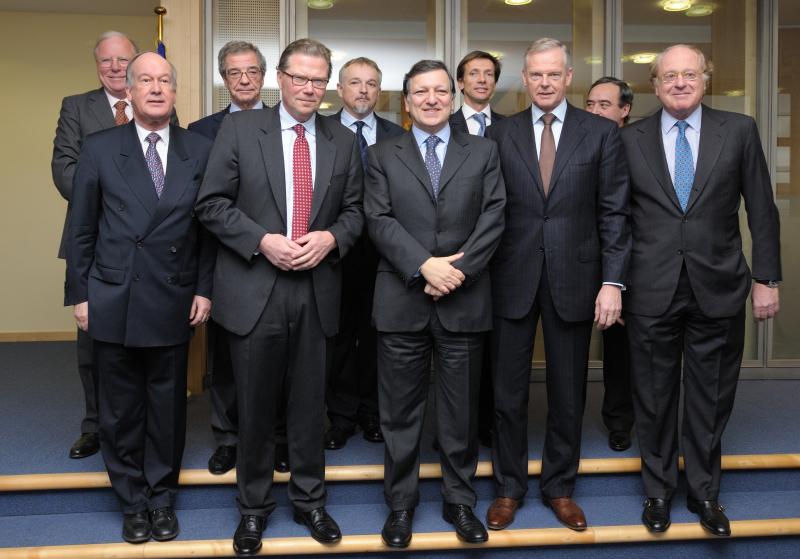
The record of a Captive Commission
The ‘black book’ on the corporate agenda of the Barroso II Commission
With the upcoming European elections, the term of the European Commission is coming to an end, and it has been a term like few others. Since it took office in early 2010, the European Union has experienced a severe financial and economic crisis that has transformed the bloc significantly. More competence over economic and fiscal policies has been given to the EU institutions in general, and the power of the Commission in particular has been boosted. Through the course of the crisis, attempts by corporations and corporate lobby groups to influence EU policies have probably been more successful than ever, in part due to a close relationship with the Commission.
Corporate Europe Observatory has gathered a lot of evidence over time and covering many different areas that shows how the Commission is easily captured by corporate interests. This report is an attempt to produce a condensed version of how the Commission has come to act on behalf of corporations over the past five years, focusing on climate policies, agriculture and food, finance, economic, and fiscal policies.
In short, European corporations have been very successful in exploiting the crisis to forward their own agendas, and the help of the European Commission has been instrumental in that effort. That is partly due to the composition of the Commission, but there is more to it than that.
The European Commission is a very powerful body. It has the monopoly on legislative proposals – all suggestions tabled in the European Union come from the Commission. And yet it is unelected, and not directly accountable to anyone. Also, the Commission generally lives its life at a comfortable distance to public debate. There is little chance that the concerns of citizens will reach the chambers of the Commission unfiltered.
On the other hand, it is a body that is easy to penetrate for corporate lobby groups with ample financial resources, for various reasons. For instance, the fact that the Commission has relatively few economic resources itself, with little in-house expertise, makes it all the more easy for corporate lobby groups to step in and influence the agenda.
Thus an increase in the competence of the Commission tends to be directly proportional with corporate capture of EU decision making, which is why the current trend in that direction should raise concern. From the very beginning the Barroso II Commission has followed a corporate agenda, and its close links to the biggest corporations and banks in the European Union is a key trait of the current European project.
This report is released at a time when these issues should be debated broadly. As if the Commission itself has realised it has an urgent need for a stronger legitimacy, it has played its part in helping the European Parliament stage a kind of indirect election for the Commission President for the first time. Whichever political group in Parliament wins the most support will elect the Commission President. What remains to be seen is whether the other actor in the selection of the President, the Council, will play along with their choice.
In any case, we believe such an indirect election will do little if anything to fix the democratic deficit of the Commission. More fundamental problems are at play, and those problems are the topic of this report.
The report attempts to capture the key experiences of Corporate Europe Observatory with the outgoing Commission in the core areas covered by our research, including trade, agriculture/agribusiness, finance, climate change, water privatization, and economic policies, particularly policies adopted in response to the eurocrisis. In all these areas the presence and influence of corporate lobby groups on the Commission has been a key feature of its actions all along.
But despite this, there has been very little progress on lobbying transparency and ethics, as this report shows. CEO and many other public interest groups have worked throughout the term of this Commission to strengthen the rules on transparency and ethics in order to erect some obstacles to excessive lobbying influence and open the Brussels scene to greater public scrutiny. We have campaigned for transparency via a mandatory register for lobbyists, on ethical conduct, against imbalanced advisory structures, on “revolving doors”, and many other issues. This report looks at the most important issues with the Commission in this regard, and it reveals a rather bleak picture.
The chapters can be read separately, but they all form part of the same story: that of corporatecapture of the Barroso II Commission. We are not reviewing this for sentimental reasons, nor to close the book on past events, but rather to examine the long term and fundamental problems, and look ahead to explain the potential challenges of the incoming European Parliament and Commission to reverse this trend. The topic of the conclusion covers some of the steps that need to be taken to address this corporate capture.

Comments
Compulsory reading... We all love Europe but who wants that KIND of Europe?